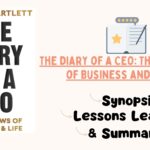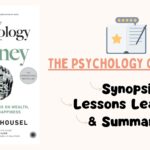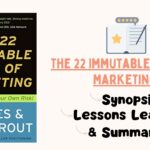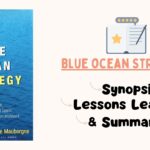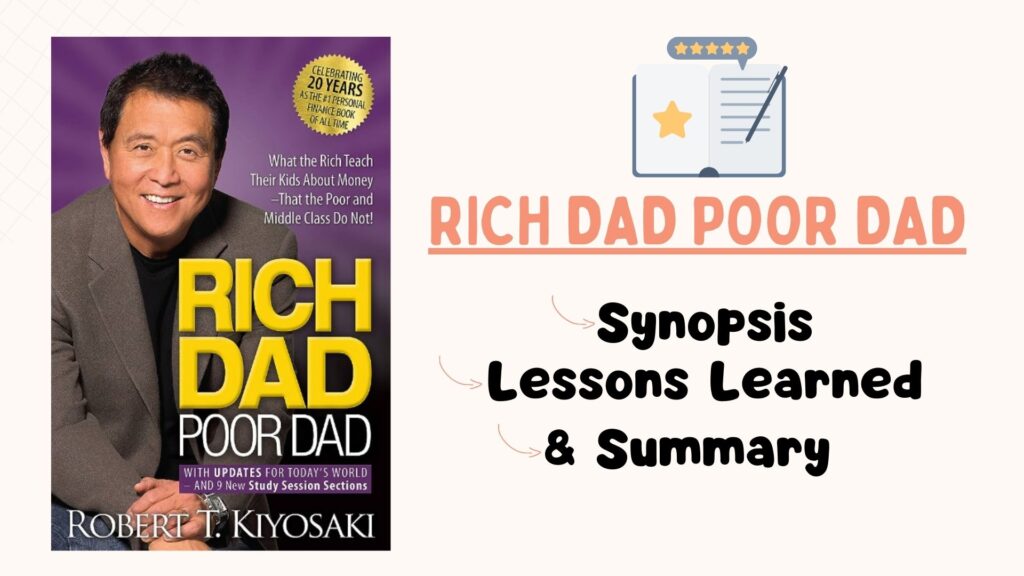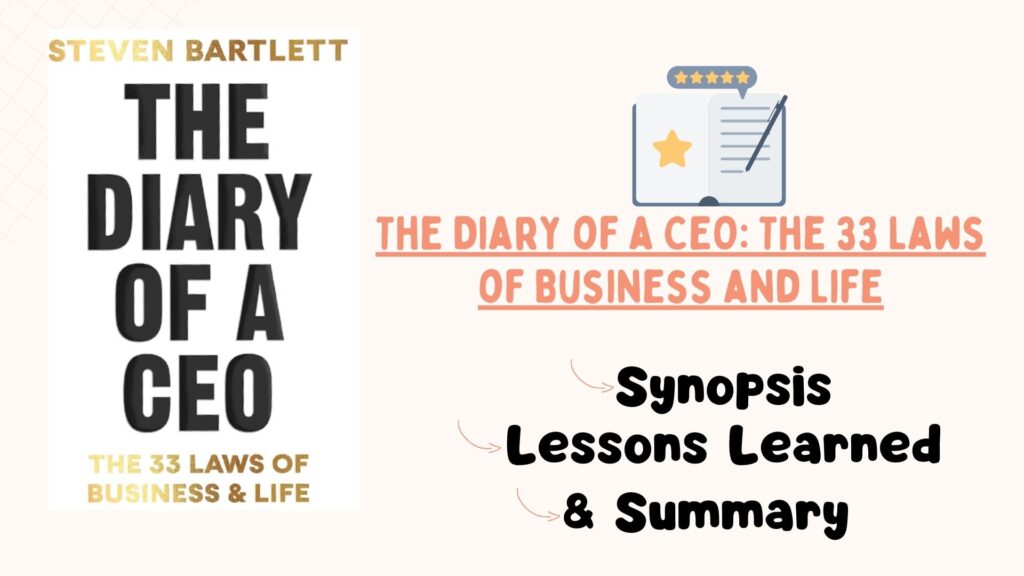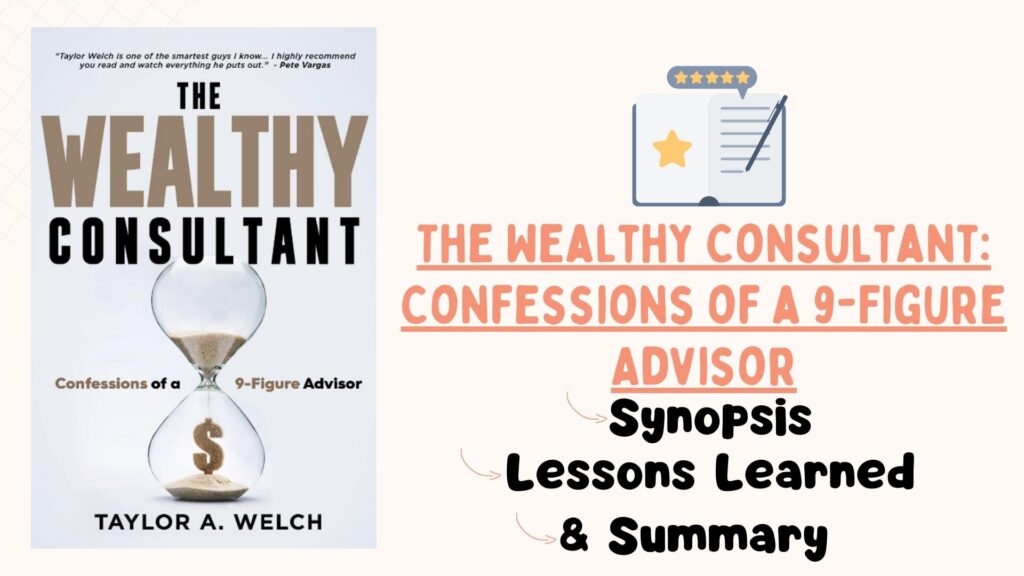Revered as a classic in personal finance literature, “Rich Dad Poor Dad” by Robert Kiyosaki imparts crucial financial wisdom through the author’s own experiences growing up with two father figures. The book presents a stark contrast between the philosophies of his own father (referred to as “Poor Dad”) and the father of his best friend (referred to as “Rich Dad”), ultimately teaching readers about investing, wealth-building, and the mindset shift required to achieve financial independence. With its unconventional teachings, readers should approach “Rich Dad Poor Dad” with an open mind, ready to challenge traditional financial norms and embrace the potential for a more prosperous future.
Key Takeaways:
- Financial Education: The book emphasizes the importance of financial literacy and the need to educate oneself about money, investing, and wealth building.
- Asset vs. Liability: Understanding the difference between assets and liabilities is crucial for building wealth, and the book explains how to make smart investment choices that generate passive income.
- Mindset Shift: “Rich Dad Poor Dad” encourages a shift in mindset from being an employee to becoming an investor, taking control of one’s financial future, and seeking opportunities for wealth creation.
- Entrepreneurship: The book advocates for the benefits of starting a business or investing in income-generating ventures as a means to achieve financial freedom and security.
- Real Estate Investment: Robert Kiyosaki, the author, promotes real estate as a key avenue for wealth creation and discusses the benefits and strategies for successful real estate investment. I personally have a different approach to this, but we will talk about this more.
The Philosophy of Rich Dad
If you have ever read ‘Rich Dad Poor Dad’ by Robert Kiyosaki, you may have been introduced to the philosophy of Rich Dad. This philosophy encompasses a set of principles and beliefs about money, wealth, and financial independence. It reflects a mindset focused on creating and building wealth, rather than just earning a living.
The Importance of Financial Education
To Rich Dad, financial education was the key to achieving financial success. He believed that traditional education often fails to provide individuals with the knowledge and skills necessary to effectively manage their finances and build wealth. It is the understanding of how money works and how to make it work for you that sets the financially successful apart from those who struggle with money.
Financial education involves learning about investment strategies, understanding different financial instruments, and developing the mindset of an investor. It is about acquiring the knowledge and confidence to make informed financial decisions and take control of one’s financial future.
Building Assets over Liabilities
On the other hand, Rich Dad emphasized the importance of building assets over liabilities. Instead of accumulating liabilities such as excessive debt and unnecessary expenses, he encouraged focusing on acquiring income-generating assets such as real estate, stocks, and businesses. By doing so, one can create a sustainable source of income and build long-term wealth.
It is crucial to shift your focus from consumerism and material possessions to building assets that generate passive income and appreciate in value over time. This approach is fundamental to achieving financial freedom and creating a solid financial foundation for the future.
Lessons from Poor Dad
Assuming you have read the ‘Rich Dad Poor Dad’ book by Robert T. Kiyosaki, you are already familiar with the concept of having two father figures, a rich dad, and a poor dad. In this chapter, we will delve into the lessons learned from the author’s poor dad, and the impact it had on his financial education and mindset.
The Value of Traditional Education
On the one hand, the author’s poor dad, who was well-educated with advanced degrees, believed in the traditional path of formal education and obtaining a stable job. He emphasized the importance of academic success, holding high-paying jobs, and staying within the comfort of a steady paycheck. While these are important factors, the book highlights how this mindset can potentially limit one’s financial growth and ability to break free from the constraints of traditional employment.
The Limitations of a Salary-Dependent Lifestyle
Education plays a vital role in shaping an individual’s mindset and approach towards financial independence. However, relying solely on a salary and benefits can create a narrow-minded perspective and hinder the pursuit of wealth accumulation and passive income. It is imperative to understand the dangers of being stuck in a cycle of living paycheck to paycheck, without actively seeking ways to multiply and invest one’s earnings.
from traditional education, salary-dependent lifestyle, financial growth, passive income.
Practical Financial Strategies
For anyone looking to attain financial independence, having practical financial strategies is crucial. In this chapter, Robert Kiyosaki discusses various approaches to building wealth and achieving financial freedom. From investing in real estate to starting and growing businesses, and understanding the role of tax planning, Kiyosaki provides valuable insights into practical financial strategies that can lead to long-term success.
Investing in Real Estate
Any savvy investor knows that real estate can be a lucrative avenue for generating wealth. Kiyosaki emphasizes the importance of understanding the market and seizing opportunities to acquire properties that can appreciate in value over time. He shares strategies such as leveraging other people’s money and using cash flow from rental properties to build wealth. The key is to educate oneself about the real estate market and make informed decisions to maximize returns.
I personally wont be “investing” in real estate. This may be a huge shocker to some… But its only because I have better opportunities for growth else where. Those who know me know that I am heavily diversified on the inter webs! I have many websites that generate an income for me every single month, the rate of return *(investment wise) blows real estate out the water. Now thats only because I have; technically speaking: a high income skill(s) which has allwoed me to build these online business.
Don’t get me wrong either im not that amazing, my buddy Alex Becker has a net worth of over 130 million and my mentor Gerard Adams has a net worth of over 58 million, so my skills are minute compared to these guys but in the grand scheme of life and this big world we live in my skills are certainly are acquired and built over time.
Starting and Growing Businesses
Practical business strategies are essential for anyone aspiring to be an entrepreneur. Kiyosaki delves into the mindset and skills required to start and grow successful businesses. He emphasizes the importance of identifying opportunities, taking calculated risks, and building a team to support the business’s growth. Real-life examples and actionable advice make this subsection a valuable resource for anyone looking to create their own path to financial success.
Realizing the potential of starting and growing businesses is crucial for individuals seeking to achieve financial independence. Kiyosaki’s insights shed light on the importance of entrepreneurship and how it can be a pathway to generating significant income and long-term wealth. By leveraging one’s skills and resources, anyone can create and grow successful ventures, ultimately leading to financial freedom and security for the future.
The way I look at this aspect is building and growing businesses are your cashflow money generators outside of the typical concept of investing. Think of it like this: lets use Jeremy as an example…
jeremy is a college student and wants to own real estate one day, specifically he wants to own 25 units so he never has to go to work again. Jemery is in school to be a veterinarian and he has skill of making pizza. Everyone tells him how amazing his pizza making skills are. He realized he doesn’t have a passion to make pizza but he is okay with doing it for some money.
Lets say he has an opportunity to open a small business to help him pay his was through school. Then if he opens this small pizza business its sole purpose is for cashflow. That pizza business will replace his day job at the library in hopes of making more money. From the revenue of that investment he can use towards his college fees, or even his first investment! Like an investment in a IRA account or investing in some dividend paying stocks.
There are many options for Jeremy in the case that his “cashflow” system actually generates some cash…
The investment is the part where he puts money in to get money out and have his money work tirelessly for him. He doesn’t necessarily need any kind of effort to make the dividend thats being paid.
The Role of Tax Planning
Role of Tax Planning is a crucial aspect of building and preserving wealth. Kiyosaki emphasizes the impact of taxes on one’s financial well-being and discusses strategies to minimize tax liabilities. He highlights the importance of understanding tax laws, utilizing tax-deductible investments, and structuring businesses to optimize tax benefits. By implementing effective tax planning strategies, individuals can retain more of their hard-earned money and accelerate their journey to financial independence.
Growing wealth while minimizing tax obligations is a key element of financial success. Kiyosaki’s insights on the role of tax planning provide valuable guidance for individuals looking to optimize their financial strategies. By implementing tax-efficient investment and business structures, individuals can maximize their wealth accumulation and create a more secure financial future.
Understanding Taxes
Creating a Personalized Financial Plan
To achieve financial success, it is crucial to have a personalized financial plan that aligns with your goals and capabilities. This plan will serve as your roadmap to financial freedom, guiding you through the steps necessary to secure your financial future.
Assessing Your Financial Health
To create a personalized financial plan, you must first assess your current financial health. This involves taking stock of your assets, liabilities, income, and expenses. Understanding your financial situation will enable you to identify areas for improvement and set realistic goals for the future.
To further assess your financial health, it is important to evaluate your spending habits, debt levels, and savings rate. This will provide a comprehensive understanding of your financial standing and help you make informed decisions regarding your financial plan.
Setting Financial Goals
Healthy financial planning involves setting clear and achievable financial goals. This includes short-term, mid-term, and long-term objectives that are specific, measurable, achievable, relevant, and time-bound. Setting realistic financial goals will provide a clear direction for your financial plan and motivate you to stay on track.
Additionally, establishing an emergency fund, saving for retirement, and investing for wealth accumulation are key components of a solid financial plan. These goals will help you build a strong financial foundation and secure your financial future.
A solid financial plan provides a roadmap to achieving financial success. It involves assessing your financial health, setting clear and achievable financial goals, and continuously learning and adapting to ensure long-term financial stability.
Continuous Learning and Adaptability
To maintain financial success, continuous learning and adaptability are essential. Keeping abreast of financial trends, investment opportunities, and wealth-building strategies will help you make informed decisions and adapt to changing market conditions.
Plus, staying open to new financial knowledge and being willing to adapt your financial plan as needed will position you for continued success.
The Rich Do NOT Work For Money
When i first read that “rich dont work for money” i rally didn’t understand what Robert was trying to say. Where me and Robert differ is our understand of the word “rich”. To Robert being rich and being wealthy are the exact same. To me they are different and thats why there was the initial confusion.
You can watch my youtube video where i break down the difference here:
This statement: “the rich don’t work for money.”, encapsulates a fundamental difference in mindset and approach towards wealth between the financially successful and others. Here’s what Kiyosaki means by this phrase:
- Money Works for Them: Instead of trading time for money as in a traditional job, the wealthy focus on building assets that generate income. This might include investments, real estate, businesses, and other income-generating ventures. The idea is to create streams of passive or residual income that earn money without the need for constant active work.
- Financial Education and Intelligence: Kiyosaki argues that financial education is crucial. The rich understand how money works and how to make it grow through investments and managing assets. They are knowledgeable about financial matters such as accounting, investing, market trends, and risk management.
- Creating Value: The wealthy focus on creating value and solutions to problems, which in turn generates wealth. This mindset is about looking for opportunities to innovate or fill gaps in the market, rather than just working a job for a salary.
- Leveraging Resources: The rich leverage other people’s time, money, and skills to build their wealth. Instead of doing all the work themselves, they employ the expertise and labor of others, which allows them to focus on expanding their ventures and investments.
- Risk Taking and Resilience: Wealthy individuals often take calculated risks to achieve greater financial rewards. They are not afraid of failure, and they see setbacks as learning opportunities.
- Long-term Vision: Rather than seeking immediate gratification through spending, the rich plan and act with a long-term perspective on wealth. They reinvest their profits to build sustainable wealth over time.
In summary, when Kiyosaki says “the rich don’t work for money,” he’s highlighting a mindset where the primary goal is to accumulate assets that generate income, rather than relying solely on exchanging time for a paycheck. It’s about understanding and leveraging financial principles to create and maintain wealth.
Final Words
Conclusively, ‘Rich Dad Poor Dad’ is a compelling and thought-provoking book that challenges conventional wisdom about money and financial success. Through the contrasting stories of two influential figures in the author’s life, Robert Kiyosaki provides invaluable insights and lessons on the mindset, behaviors, and strategies necessary for building wealth and achieving financial independence. The principles presented in this book serve as a wake-up call to the traditional notions of success and provide a roadmap for individuals to take control of their financial futures. ‘Rich Dad Poor Dad’ is a must-read for anyone seeking to gain a deeper understanding of the principles of wealth creation and financial literacy.
I will be completely honest, I was already doing majority of what Robert kyoski was saying. Im not an employee, I technically fit in the self employed small business side of things and also the investor side of things. My workflow is simple, i put some of my money in things i see can grow and pay me, just like Robert kiyoski says. Instead of buying real estate that cost me time to manage with only an average of 3.5% returns annually i can invest money into growing/building/buying a website and make 124% returns on average per site.
For people that don’t feel comfortable working with websites and running online business i can understand how real estate would be ideal for them, but for me it just doesn’t make sense to waste time going down that route to save money on taxes. The money I make from my website building business cover the cost of any tax money I would have saved if i would have went down the real estate route and pays me much much more then any real estate ever could.
Don’t get me wrong, will i and have I bought real estate? YES! but its for my own “fun” not for the purpose of investment. I defiantly would be fixing and flipping (yes, i have done 3 flips in my past) and i sure as hell wont be renting out my properties to any tenants! It cost too much from a piece of mind perspective and the payout once again doesn’t even compare to my online businesses.
I am not saying investing in real estate is bad, for most people is great. But respectfully speaking, for me there are better opportunities.
FAQ
Q: What is the main premise of the book “Rich Dad Poor Dad”?
A: “Rich Dad Poor Dad” discusses the differences in mindset and financial habits between the author’s two fathers, highlighting the lessons he learned from his rich dad in contrast to those from his poor dad. Robert really emphasis that its people decisions that make them poor because of the lack of education and the rich are more educated then the poor, when it comes to topics like: investing, and taxes. But if you don’t take anything from the book take this: the rich accumulate assets that may them! The poor buy things that DO NOT pay them which are known as liabilities.
Q: What are the key concepts introduced in “Rich Dad Poor Dad”?
A: The book introduces concepts such as the importance of financial education, the difference between assets and liabilities, and the significance of taking calculated risks to build wealth.
Q: How does “Rich Dad Poor Dad” encourage readers to change their outlook on money?
A:Immersing yourself in ‘Rich Dad Poor Dad,’ you get schooled by Robert Kiyosaki on the nitty-gritty of financial wisdom, contrasting two pivotal influences in his life: his own dad (the ‘Poor Dad’) and his friend’s dad (the ‘Rich Dad’). This book isn’t just a read; it’s a revelation in wealth-building and investing, painting a stark picture of how different mindsets carve out financial futures.
Key to the Rich Dad philosophy is financial education. It’s not just about stashing cash or clocking in hours at a job. It’s about understanding money, where it flows, and how it can work for you. The Rich Dad sees opportunities, risks, and rewards in a way that the Poor Dad doesn’t.
Here’s the kicker – assets versus liabilities. Kiyosaki drums this in: the rich, they accumulate assets, things that put money in their pockets. The others? They’re bogged down with liabilities, stuff that takes money out. It’s not rocket science, but it’s profound.
He urges a shift in mindset. Think investor, not employee. You want your money working like a tireless employee, generating more wealth, not just lying around. It’s about making money-savvy moves, thinking ahead, investing wisely.
Kiyosaki also hammers in on real estate. It’s like his golden goose of investment. But here’s my take: while real estate is cool and all, it’s not the only game in town. For me, the digital space – websites, online businesses – that’s where the action is. The returns? They can be mind-blowing, way beyond what traditional real estate offers. And sure, I get the tax perks of property investments, but my online ventures? They more than make up for it in profits and don’t tie me down.
So, do I dabble in real estate? Sure, for kicks and personal enjoyment. But as a hardcore investment strategy? I’ve got my eyes on the digital horizon. Online business is my kind of asset – less hassle, more scalable.
To wrap it up, Kiyosaki’s ‘Rich Dad Poor Dad’? It’s a game-changer. It pushes you to rethink money, to see beyond the paycheck-to-paycheck slog. Whether it’s real estate, stocks, or the digital marketplace, the endgame is about making your money work for you, building assets, and steering clear of those sneaky liabilities
Q: What are some practical steps suggested in “Rich Dad Poor Dad” for achieving financial success?
A: The book advises readers to invest in assets such as real estate and stocks, start their own businesses, and seek opportunities to generate passive income in order to attain financial prosperity. Let me explain:
- Financial Education: Educate yourself about money and finances. Kiyosaki emphasizes that financial literacy is a crucial foundation for success. This includes understanding the basics of investing, how money works, the differences between assets and liabilities, and how to read financial statements.
- Invest in Assets: Focus on acquiring assets that generate income. Kiyosaki distinguishes between assets that put money in your pocket, such as real estate investments, stocks, bonds, or owning a business, and liabilities that take money out of your pocket, like car payments, mortgages, and other debts.
- Avoid Debt: Minimize liabilities and avoid bad debt. While some debt can be used to leverage investments (good debt), consumer debt for depreciating items is generally harmful to building wealth.
- Mindset Shift: Change your mindset from an employee to an owner. Instead of seeking security through a job with a steady paycheck, look for opportunities to create or invest in income-generating ventures.
- Create Multiple Income Streams: Don’t rely on a single source of income. Build multiple streams of income through investments, side businesses, or other entrepreneurial ventures.
- Take Calculated Risks: Be willing to take smart, calculated risks. Understand the difference between risky gambles and calculated risks that are part of a well-thought-out investment strategy.
- Learn from Failure: View failures as learning opportunities. Kiyosaki suggests that failure is part of the process of learning how to be successful.
- Make Your Money Work for You: The goal is to have your money earn more money for you, whether it’s through investments, real estate income, royalties, or business ventures.
- Continuous Learning: Stay committed to continual learning and growth. This can involve reading books, attending seminars, or learning from mentors who have achieved the type of success you aspire to.
- Take Action: Finally, Kiyosaki emphasizes the importance of taking action. Knowledge alone isn’t power; it’s potential power. Applying what you learn and taking concrete steps is key to achieving financial success.
These steps are about more than just making money; they represent a shift in how one perceives money, investment, and personal finance, urging a move away from traditional notions of employment and financial management towards a more proactive, entrepreneurial approach.
Q: How has “Rich Dad Poor Dad” impacted readers and their approach to personal finance?
A: “Rich Dad Poor Dad” has inspired many readers to reconsider their approach to money, leading them to pursue financial literacy, invest in income-generating assets, and adopt a more entrepreneurial mindset in their pursuit of wealth.


